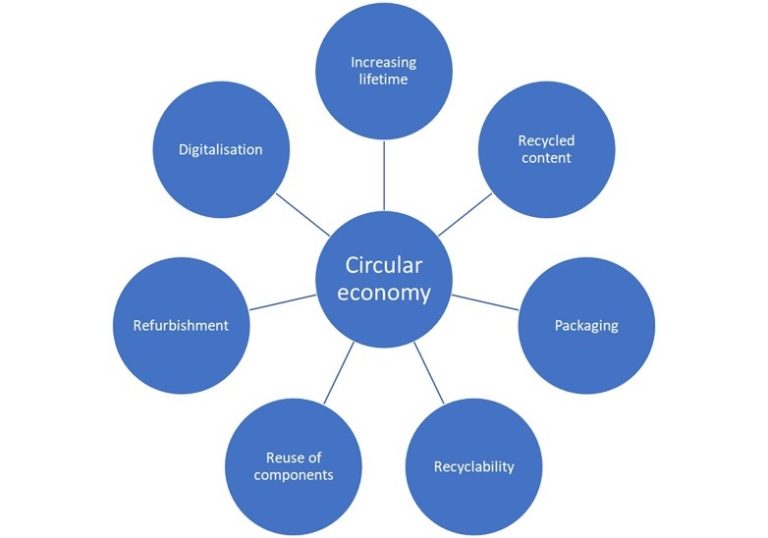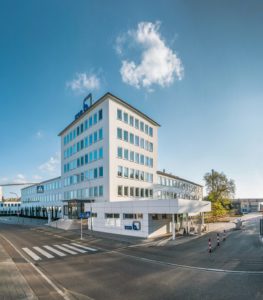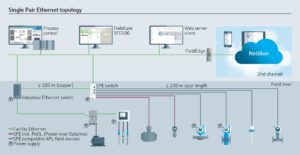Europump Presents its Approach to the Circular Economy

Analysis of circular economy for pumps. (Image source: Europump)
The transition to a circular economy is expected to support the efficient use of natural resources and create sustainable growth and jobs. It is considered as a prerequisite to achieve the EU’s climate neutrality target and to halt biodiversity loss.
The new action plan announces initiatives along the entire life cycle of products. It targets how products are designed and encourages sustainable consumption. It aims to ensure that waste is minimised, and the resources used are kept in circulation within an optimised eco-system for as long as possible.
Europump, the European Association of Pump Manufacturers, which represents 16 National Associations in 12 EU Member States, Russia, Switzerland, Turkey, and the UK has recently produced a position paper that explains in more detail how the European Pump Industry interprets the requirements of the Circular Economy Action Plan and how the associated initiatives will dovetail into its future work and activities.
Increase lifetime of pumps
Pump applications and operational conditions can vary and therefore the lifetime of a pump varies significantly, for example, a few weeks for a slurry pump, and up to decades for clean water pumps. The key to a long lifetime of a pump is the proper selection of the operating point. If the operating point is close to Best Efficiency Point (BEP) or within the recommended range of operation, this will increase the pumps lifetime.
The correct and regular maintenance of pumps prolongs their lifetime and reduces the risk of serious failure. Maintenance and repair of larger industrial pumps is common practice. However further investigation is required on the smaller and domestic pumps.
Recycle content of pumps
Use of recycled materials is already customary practice in the pump industry, e.g. cast iron is already a mixture of new iron and scrap metal. Such processes could be challenged by substance regulations for example lead in non-ferrous alloys, as specified by REACH regulation. Use of industrial grade plastic parts (non-recycled) in some circumstances can be more eco-friendly. Plastics can enable the reliable pumping of hazardous fluids and can last the lifetime of a pump (on average more than 10 years).
In some pumping applications, e.g. chemical types, there is no effective recycled substitute. Non-recyclable technical plastics are intended not to end up in the environment, but instead into a controlled waste stream. In some instances, they can be incorporated into construction material, for example concrete. As soon as technical plastics become more readily recyclable, we can investigate whether they can be integrated more into new pump products.
Recyclability of pumps
In general, all metals used in pumps are already recycled today. Pump manufacturers as well as users are well aware of the value of scrap material. This ensures that virtually all metal is recycled. Substances listed under the REACH directive may prevent or limit the recycling of materials in the future. Improvements in actual recycling are ongoing thanks to the application of the WEEE directive. The use of recycled plastic is increasing. Packaging material such as cardboard, plastic foils and strapping are currently recycled. Euro pallet which is made from timber has a deposit system which exists for circularity.
Pumps in the chemical industry have very different compositions, such as more plastic and elastomers due to aggressive properties of the pumped medium. Slurry pumps are another example of different compositions due to the high rate of wear experienced. Recycling of plastics and elastomers is more challenging than the recycling of metals due to the complex chemistry involved.
System components such as motors, VSDs, sensors etc are covered under the WEEE directive and recycled through the proper channels. The responsibility of this is with the pump manufacturer, but the process varies across Europe.
Packaging
Packaging material such as cardboard, plastic foils and strapping are currently recycled. Plastics used in packaging have an increasing recycled content. Ongoing transition in the industry is away from plastic-based packaging and a move towards renewable materials.
As mentioned previously, Euro pallet, which is made from timber, has a deposit system which exists for circularity. They are reused and if damaged can be repaired and put back into circulation. There are however different packaging materials for consumer goods than for industrial goods. Packaging is used to protect the product during transportation, with modern sales channels requiring more rugged packaging for shipping.
Reuse of components in pump units
Some pump companies have experience in reusing parts, usually within their service centres. For example, rotating or wear components might be replaced but the pump housing and base plate might be reused. Or a new pump head might be fitted to an existing pump housing. Due to legal and safety aspects, this can only be done in agreement with the customer
Refurbishment of pump units
Refurbishment service is already well-established within the pump industry. In general, the larger the pump unit the more actions are taken to increase lifetime of that pump unit. The assessment of resource efficiency vs. energy efficiency influences the decision whether to refurbish or replace a pump unit. Examples are:
- Repairs to the motor: Assessment of the Total Cost of Ownership (TCO) of a new motor versus that of a rewound motor.
- Refurbishment or replacement of worn parts: Pump housings, impeller, shafts, restoration of internal coatings.
- Refurbishment or replacement of bearings and/or mechanical seals: This is generally undertaken upon service inspection, during pump dismantling, or after the recommended running hours.
- The decision to refurbish or replace may also be influenced by possible increases in efficiency of the new replacement pump.
Digitalisation
Digitalisation will positively affect the circular economy. Europump first understood the importance of digitalisation near the end of the 20th century. Life cycle cost analysis started digitalisation of our products and realised its effect on both the circular economy and sustainability.
Pump monitoring and controls enable customers to run pump units at optimum efficiency and determine possible pump failures ahead of time. Europump supports the idea of a Digital Product Passport. This must be limited by Intellectual Property (IP) concerns.
The growth of digitalisation and the acquisition of pump performance data, will help to improve life cycle analysis.
Commenting on the publication of this position paper, Jim Wall, Chairman of Europump’s Circular Economy Working Group, said: “This important body of work is a further example of the proactive role Europump continues to adopt in promoting the technical and economic progress of the pump manufacturing sector, whilst ensuring the regulatory landscape in which it operates fully supports its future development.
He continued, for over six decades, Europump has served as the voice of the European pump industry, to offer expertise on all sector related matters, and to provide an effective forum for dialogue on topics of joint concern to its members. Having now delivered its position statement on the effective adoption of circular economy principals
and objectives, the pump sector can continue along its already established and proven path of delivering optimum levels of sustainability and energy efficiency for both itself and its end user customers.”
Source: Europump







